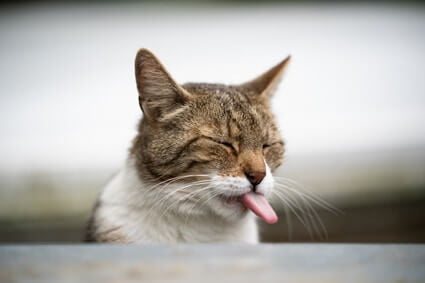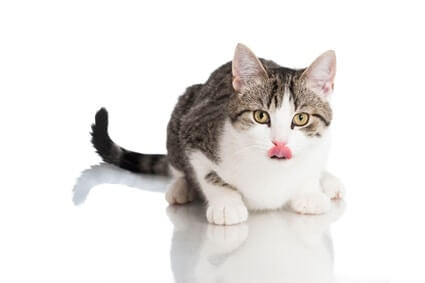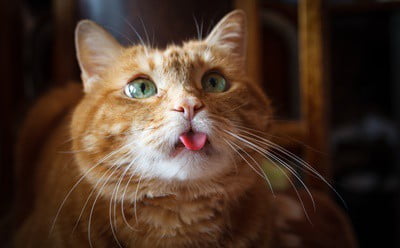We observe our cats engaging in all sorts of funny and strange activities. From presenting us with gifts to bouncing off the walls, there’s no shortage of antics from cats. Perhaps one of their cutest (and strangest) habits is a cat sticking out its tongue for no reason. If the cat isn’t grooming or lapping up water, it can seem entirely random.
Cats usually stick their tongue out when they’re relaxed and content. They may also ‘blep’ when they’re using the Flehman response to detect pheromones and scents. If the cat has food or pieces of a toy stuck in its mouth, it will stick out its tongue to expel that. Sometimes, a cat will even do this when it’s been poisoned and is trying to breathe easier. A less harmless reason will be if it’s slightly overheated, so watch for symptoms of heatstroke.
Cats of all ages will stick their tongues out, and it’s usually harmless. Elderly cats do this because they nap more often, and cats are likely to stick out their tongue when asleep. Young kittens also do it to taste the air and cool down. As long as your cat isn’t drooling excessively, showing negative symptoms, or blepping too often, it’s just a funny habit.
Why Do Cats Sometimes Stick Out Their Tongues?
Unlike humans, cats don’t stick out their tongues to mock their rivals or annoy their loved ones. Instead, cats usually reveal their tongue only when they’re yawning, lapping up water, or grooming themselves.
These activities have a clear purpose for the tongue. As such, you may be confused whenever your cat’s tongue appears to stick out randomly, for no reason. That’s especially true if your cat is staring through a window, tongue out in a derpy way. Although it seems random, this also serves a purpose. Your cat may be:
Feeling Relaxed
Cats are active creatures that spend their energy in quick bursts. When these felines finally sit down and take a breather, they will relax their body and shut their eyes for a quick nap.
Your cat’s jaw plays a key role in keeping their tongue firmly in place in their mouth. When the cat decides to relax its jaw muscles, the tongue may inadvertently begin sticking out. This is similar to how some people sleep with their mouths hanging open. It’s completely natural.
Owners shouldn’t feel worried. In fact, a relaxed cat is usually a happy cat. Feel proud that your cat is safe and secure in your home environment.
Expelling Food
If you notice your cat darting its tongue out repeatedly for a few seconds, it may be trying to remove bits of food or debris from its mouth. This is because felines do not spit in the same manner that humans do. Instead, they must rely on their tongue to expel these food pieces.
If this is the case, check to see if there are any bits of food or pieces of a ruined toy stuck in your cat’s teeth. Some of this debris can irritate your cat’s mouth and lead to discomfort. You may need to help your feline dislodge the annoyance.
Cats will also do this when they are attempting to rid their mouth of an unpleasant flavor. Owners should be concerned if this behavior persists for more than a minute or two. It’s possible your cat ate something it wasn’t supposed to.
Ingesting Poison
Cats stick their tongues out when they have ingested something poisonous. This may include a random plant found outside, a venomous bug, or a kitchen ingredient that your feline gained access to. Once the cat begins to feel unwell, it will stick its tongue out to:
- Remove the taste
- Try to spit out the residue
- Get more air, should its mouth or throat begin to swell
In certain cases, extreme poisoning can be fatal. Signs your cat may have eaten something poisonous include:
- Excessive salivation
- Diarrhea
- Vomiting
- Twitching
- Difficulty breathing
If your cat is exhibiting these symptoms while sticking its tongue out, you should take it to a vet. Try and narrow down what your cat may have eaten so that the vet knows how to respond. Common foods that are poisonous for cats include:
- Onions
- Orange peel
- Garlic
- Chocolate
- Caffeinated Drinks
Cooling Down
Cats stick their tongues out when they are overheating. Felines don’t pant as overtly as dogs do, but they may still extend their tongue to cool off. This lets them take in more air and lower their body temperature by expelling unnecessary heat. If the panting continues for a few minutes, then don’t worry.
You should only be concerned if it’s a particularly hot day or if your cat shows other symptoms. In the worst case, it may indicate heat stroke. Watch out for:
- Drooling
- Agitation or restlessness
- Breathing problems
- Bright red tongue
- Deep red or pale gums
If you suspect your cat is sticking its tongue out due to heatstroke, you should;
- Move it to a cooler setting
- Apply cool water to it fur
- Avoid dousing it in very cold water, as that may worsen the problem
Owners should always take their cats to the vet if they suspect heatstroke. This is true even if the signs do not appear serious initially, as they may escalate quickly.

Why Does a Cat Blep?
Many owners report seeing their cats leave their tongues hanging out. In these situations, your feline may not be actively sticking its whole tongue out – just the tip. That’s commonly referred to as “blepping.” Most cats blep when they’re relaxing or sleeping. As mentioned earlier, this is unintentional behavior that happens when their jaw is relaxed.
However, some cats will blep when they are awake and alert. This is a different type of blepping, which occurs due to the Flehmen response. According to the Journal of Feline Medicine and Surgery, the Flehmen response is a special behavior that felines engage in when:
- Investigating their surroundings
- Trying to understand a particular object
- Narrowing down and separating particular scents from one another
That’s because cats can gather, interpret, and understand pheromones using the roof of their mouth. By slightly opening their mouth and sticking out their tongue, cats collect external scents and pheromones. These pass along the vomeronasal organ, which is located within their mouth.
The olfactory system then interprets whatever they gather to give a cat new information. Some cats even use it to understand:
- If another cat is nearby
- Where exactly it’s located
- What its sex is
- If they’ve met before
Cats also detect information about prey, predators, food, water, and curious new objects. As such, your cat will likely blep if it’s entered a new environment. It may also do it randomly whenever it catches a new smell in the air or spies a new toy. This is completely natural and nothing for an owner to worry about.
Cat Sticking Tongue Out and Drooling
If your cat is sticking its tongue out and drooling, it can be bad or good news. You should definitely take a closer look to make sure.
Normal Drooling
Different animals drool from time to time, and cats are no exception. It’s common for cats to stick their tongue out slightly and drool when engaging in relaxing activities. This includes kneading or purring. They may even drool while they sleep, just like people.
Some cats also start drooling after they enjoy a nice meal. However, they rarely start salivating at the sight of food, like dogs are known to do. A cat that is salivating before a meal may be unwell and should be taken to the vet.
Some owners report seeing their cats drool after giving them medication. This may be their natural response to tasting a bitter medication they aren’t used to. Additionally, some medications, such as muscle relaxants, cause felines to drool more than usual.
You can get around this problem by crushing up the medication and mixing it in food to disguise the taste. If it continues, you should also consult with a vet to see if the prescribed medication dose is too high.
Abnormal Drooling
If your cat regularly drools or has started to drool out of nowhere, then it’s worth being concerned. It may indicate serious health problems. Drooling can be a sign of excessive saliva production triggered by oral or dental issues. This includes:
- Gum disease
- Mouth ulcers
- Tooth injuries
- Infections
If you suspect your cat has any of these problems, you should immediately take it to the vet for a checkup. A veterinarian can inspect your cat’s mouth and identify any oral issues that may be contributing to excessive salivation. The expert may correct such problems with a simple dental cleaning. Other problems may require tooth extractions or other special procedures.
Drooling can also be a sign of heatstroke. You should check for any of the other signs mentioned above and take action accordingly.
Cat Tongue Sticking Out Not Eating
If your cat is sticking its tongue out and also refusing to eat, it may indicate a cut or a blister on its tongue. Owners should be careful about this problem. A severe tongue injury may cause your feline to lose weight and become malnourished in a short amount of time.
While most cuts or blisters heal themselves, keep a close eye on the problem. If your cat does not resume its regular eating habits within a couple of days, you should intervene. Take the cat to the vet to get the problem checked out.
Why Do Cats Stick Their Tongue Out While Sleeping?
If you’ve ever spotted your cat sleeping with its tongue out, you may be tempted to poke the tip and film the reaction. As mentioned earlier, cats stick their tongues out while sleeping because their jaw is relaxed. As such, it’s no longer holding their tongue in place within the mouth.
This behavior isn’t concerning because it doesn’t harm your cat in any way. At most, it will leave your cat with a dry mouth when it wakes up. That’s a problem quickly resolved by drinking water.
Why Do Cats Stick Their Tongue Out When You Scratch Them?
Some owners report seeing their cats stick their tongues out whenever they scratch or pet them. This response may occur for three different reasons:
Relaxation
Scratching or petting your cat helps to relax it. This causes it to loosen its jaw and let its tongue out. If your cat does this, it means it enjoys your presence.

Hormones Release
Petting your cat also releases happy hormones in its body. This is similar to the happiness you feel when hugging someone. If your cat sticks its tongue out only when you pet it, that’s a sign that it’s happy and content with you.
Removing Fur
Scratching your cat may cause some strands of loose fur to fall out. If any of these strands get into your cat’s mouth, it will flicker its tongue in and out in an attempt to remove them. This behavior may also cause the cat to swallow the hair and eventually cough it up as a hairball. This is a common occurrence that doesn’t require remedying unless your cat is shedding fur excessively.
Why Do Older Cats Stick Their Tongue Out?
Owners with senior cats may also notice their feline friends sticking their tongues out. There are 2 main reasons why older cats do this:
Sleeping More
Younger cats and kittens are known for their high energy and agility. However, these energy levels decrease as the cat gets older. Senior cats spend more time sleeping than their younger counterparts. This means they are likely to stick their tongue out while getting their naps in during the daytime.
Dental Problems
As mentioned earlier, dental problems may explain why your cat is sticking its tongue out. According to Veterinary Clinics of North America, periodontal disease and chronic gingivitis are the most common feline dental diseases.
Additionally, problems such as broken or abscessed teeth are more common in older cats. These can be painful conditions that also make it difficult for your cat to eat. If you notice any of these dental problems, you should take your cat to the veterinarian immediately.
Most of the time, it’s normal (and very endearing) when a cat sticks its tongue out. However, there are times when it can indicate health issues. To tell the difference, be sure to watch how often your cat bleps and if it has any accompanying symptoms. If the cat looks relaxed and calm, then don’t worry. If it’s also drooling, shaking, or appears overheated, then it’s worth contacting a vet to be sure.


My cat is 11 years old and she has gingivitis issues. I used a water additive bought on Amazon for her gingivitis. It has really helped. She sticks her tongue out when she is lying on her back and I am rubbing her belly. I think it is a sign of total submission with her. However, I do have her teeth cleaned as often as I can
Depending upon other medical factors, sadly to say, it can be a sign of the onset of dementia. Not always, but sometimes it’s dementia. In deer, severe dementia will often evidence itself by the animal’s tongue hanging out the side of their mouth.